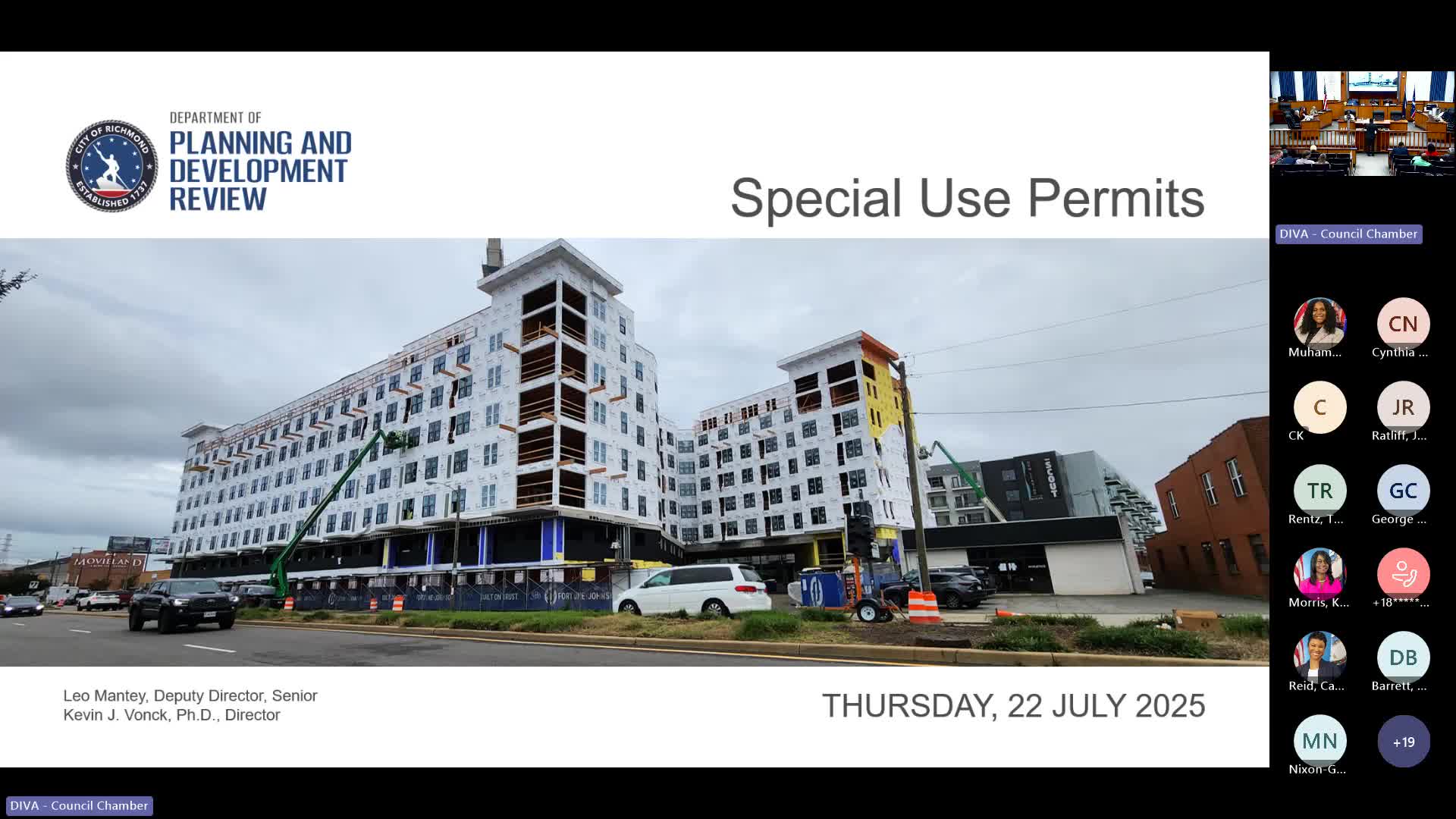Deputy Director Mente outlines Richmond's Special Use Permit progress and impact
July 23, 2025 | Richmond City (Independent City), Virginia
This article was created by AI summarizing key points discussed. AI makes mistakes, so for full details and context, please refer to the video of the full meeting. Please report any errors so we can fix them. Report an error »

The Richmond City Land Use, Housing, and Transportation Standing Committee convened on July 22, 2025, to discuss the progress and implications of the Special Use Permit (SUP) ordinance, which has been pivotal in shaping local development since its approval by the City Council. Deputy Director Leo Mente presented an overview of the SUP, emphasizing its role in allowing construction and land use in areas where standard zoning regulations would typically prohibit such activities.
Mente highlighted the outdated nature of Richmond's zoning ordinance, last updated in the 1970s, which necessitated the introduction of the SUP to accommodate evolving community needs. He explained that the SUP is granted to the land itself, allowing for its transfer between property owners while ensuring that any development does not adversely affect public safety, health, or welfare.
The committee discussed the rigorous review process for SUP applications, which involves multiple city departments, including planning, zoning, and public works, to ensure compliance with city codes and community standards. Mente noted that public notification is a critical component of this process, with efforts made to inform nearby residents and stakeholders about pending applications.
Over the past five years, the city has seen a significant increase in SUP applications, with 125 received in 2024 alone. Mente pointed out that the majority of these permits have facilitated residential developments, addressing the ongoing housing crisis in Richmond. He emphasized that the SUP has primarily supported single-family and two-family homes rather than commercial enterprises, aligning with the city's goal of enhancing residential options.
The discussion also touched on the geographical distribution of SUP applications, with a notable concentration in the R5 and R6 zoning districts, areas characterized by stricter regulations and older lot configurations. Mente concluded by affirming the positive impact of the SUP on Richmond's development landscape, while acknowledging the need for ongoing collaboration with developers to ensure that new projects align with community values and city planning goals.
The meeting underscored the importance of the SUP in facilitating necessary growth and development in Richmond, reflecting the city's commitment to adapting its regulations to meet contemporary needs.
Mente highlighted the outdated nature of Richmond's zoning ordinance, last updated in the 1970s, which necessitated the introduction of the SUP to accommodate evolving community needs. He explained that the SUP is granted to the land itself, allowing for its transfer between property owners while ensuring that any development does not adversely affect public safety, health, or welfare.
The committee discussed the rigorous review process for SUP applications, which involves multiple city departments, including planning, zoning, and public works, to ensure compliance with city codes and community standards. Mente noted that public notification is a critical component of this process, with efforts made to inform nearby residents and stakeholders about pending applications.
Over the past five years, the city has seen a significant increase in SUP applications, with 125 received in 2024 alone. Mente pointed out that the majority of these permits have facilitated residential developments, addressing the ongoing housing crisis in Richmond. He emphasized that the SUP has primarily supported single-family and two-family homes rather than commercial enterprises, aligning with the city's goal of enhancing residential options.
The discussion also touched on the geographical distribution of SUP applications, with a notable concentration in the R5 and R6 zoning districts, areas characterized by stricter regulations and older lot configurations. Mente concluded by affirming the positive impact of the SUP on Richmond's development landscape, while acknowledging the need for ongoing collaboration with developers to ensure that new projects align with community values and city planning goals.
The meeting underscored the importance of the SUP in facilitating necessary growth and development in Richmond, reflecting the city's commitment to adapting its regulations to meet contemporary needs.
View full meeting
This article is based on a recent meeting—watch the full video and explore the complete transcript for deeper insights into the discussion.
View full meeting
